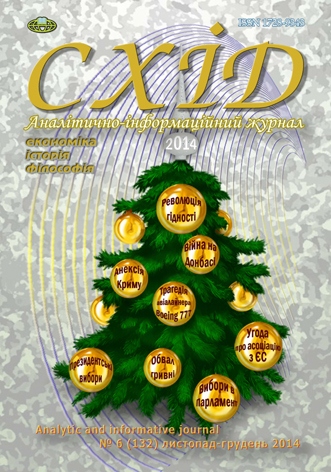Prima ratio еuropean individualism - interpretation of the meaning of the term "haecceitas" in metaphysics Duns Scotus
DOI:
https://doi.org/10.21847/1728-9343.2014.6(132).36506Keywords:
haecceitas, single meaning, formality, individualizationAbstract
The author seeks to reveal the contents Skotovoho term "haecceitas", pointing to its location in metaphysics Scholasticus and European influence on the development of individualized thinking.
Concluding should be noted that the term Skotovskyy haecceitas legitimizes in western thinking right essential to the existence of a single state in the autonomous formalities in a state of positive-singular being relative to the summum ens, preserving the unity of the personal hierarchy of the universe. This doctrinal principle axiologicaly urivnovazhyv metaphysical thinking of the natural intelligence of the individual to determine their yedynoznachnist things. Explain this view, Habermas, who notes that "... metaphysical thinking shapes suited to the individual. John Duns Scotus justifies it eventually to extend of essential also in the sphere of the individual. It gives a precise definition of Haecceitas, which also puts a stamp on individuation significant, because it is really essential opposed to individual equivalent generality".
As a mode of essential forms haecceitas makes it the ultimate reality Meanwhile "individual form," which asserts the man status uniqueness. Comprehension of "individual forms" that there is a reasonable, figuratively originality here and now finds loving will of the Creator to creation, and the inspiring personality to volitional direction defined by God to perfect forms and types. This imposes a duty on the ambivalent personality. On the one hand the individual is responsible for the terrible harmony with summum ens, on the other hand gets within their reality, to be sreatorom natural and human things - finally implement the will of God in single-unique. Latest content is the foundation of modern thinking and definitive doctrinal legitimation of Western individualism.Downloads
References
Mayorov G. G. (2001), Duns Scotus as a metaphysician, Publishing Frantsyskantsev, Moscow, рр. 28-83 (rus).
McGrath Alister E. (2008), The Intellectual Origins of the European Reformation, Nick Center, Kyiv, 344 p. (ukr).
Duns Scotus (2001), Treatise on pervonachale, Publishing Frantsyskantsev, Moscow, 181 p. (rus).
Duns Scotus (2001), Favorites, Publishing Frantsyskantsev, Moscow, 584 p. (rus).
Wolter Allan B. (1990), The Philosophical Theology of John Duns Scotus, available at : http://ebooksable.com/924625/philosophical-theology-john-duns-scotus-allan-b-wolter-marilyn-adams (engl).
Gilson Еtienne (2011), The Spirit of Mediaeval Philosophy, Institute of Philosophy, theology and history of St. Tomu, Moscow, 560 p. (rus).
Vos Antonie (2006), The Philosophy of John Duns Scotus, available at: http://www.pdf-archive.com/2011/08/23/vosjohn-duns-scotus/vosjohn-duns-scotus.pdf (engl).
Tatarkevych V. (2001), History six concepts: Art. Beautiful. Form. Creativity. Vidvornytstvo. Esthete experience, Universe, Kyiv, 368 p. (ukr).
Shmonyn D. V. [Ed.] (2005), Philosophy of Western European Middle Ages, Publishing House of St. Peterborough University Press, St. Petersburg, 299 p. (rus).
Gilson Еtienne (2004), Genesis and essence in: Favorites, Political Encyclopedia, Moskow, p. 321-582. (rus).
Reale. Giovanni, Antiseri Dario (1997), Western philosophy from the beginnings to the present day, Petropolis, St. Petersburg, 368 p. (rus).
Ermolenko A. (1999), Communicative practical philosophy, Libra, Kyiv, 488 p. 255-286 (ukr).
Louis Dupre (1993), Passage to Modernity, Yale University Press, New Haven, pp. x + 300. (engl).
Downloads
Published
How to Cite
Issue
Section
License
Copyright (c) 2015 Oleh Turenko

This work is licensed under a Creative Commons Attribution-NonCommercial-NoDerivatives 4.0 International License.
1. Authors bear responsibility for the accuracy of facts, quotations, numbers and names used.
2. Manuscripts are not sent back.
3. The publisher does not always agree with the authors' opinion.
4. The authors reserve the right to authorship of the work and pass the first publication right of this work to the journal under the terms of a Creative Commons Attribution-NonCommercial-NoDerivatives 4.0 International License. This license allows others to distribute (copy) the published work for non-commercial purposes, provided there is mandatory attribution to its authors and a link to the first publication in our journal.
5. The authors have the right to conclude separate supplement agreements that relate to non-exclusive work distribution in the form in which it has been published by the journal (for example, to upload the work to the online storage of the journal or publish it as part of a monograph), provided that the reference to the first publication of the work in this journal is included.

